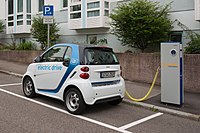As of September 2022 [update], there were 8,790 battery electric vehicles registered in Greece. [1] As of September 2022 [update], 11.8% of new cars registered in Greece were electric. [2]
Government policy
As of July 2020 [update], the Greek government offers subsidies of up to €6,000 for electric vehicle purchases, and €500 for charging station installations. [3]
Charging stations
As of June 2022 [update], there were around 1,700 public charging stations in Greece. [4] As of October 2022 [update], there was one public charging station for every 250 kilometres (160 mi) of road in the country. [5]
By region
Attica
As of August 2022 [update], there were 62 public charging stations in Athens. [6]
North Aegean
In October 2022, West Lesbos added an electric car to its municipal fleet, becoming the first municipality in Greece to do so. [7]
References
- ^ Andris, Giorgos K. (12 September 2022). "Πόσα ηλεκτρικά αυτοκίνητα κυκλοφορούν στην Ελλάδα;". newsauto.gr (in Greek). Retrieved 3 November 2022.
- ^ "ACEA: Συνεχίζουν να αυξάνουν το μερίδιο τους τα ηλεκτρικά αυτοκίνητα". Car and Driver (in Greek). 3 November 2022. Retrieved 3 November 2022.
- ^ "Greece introduces purchase subsidy for electric vehicles". electrive.com. 8 June 2020. Retrieved 3 November 2022.
- ^ "Ηλεκτρικά αυτοκίνητα: Πόσοι σταθμοί φόρτισης υπάρχουν στην Ελλάδα;". EnergyWorld (in Greek). 3 November 2022. Retrieved 3 November 2022.
- ^ "Ηλεκτρικά αυτοκίνητα: Τι πάει λάθος στην Ελλάδα". iEidiseis (in Greek). 18 October 2022. Retrieved 3 November 2022.
- ^ "Η Αθήνα έχει τον 6ο μικρότερο συντελεστή φορτιστών για ηλεκτρικά οχήματα στην Ευρώπη" (in Greek). CNN.gr. 4 August 2022. Retrieved 3 November 2022.
- ^ Lahouri, Dimitra (14 October 2022). "Πρώτος στην Ελλάδα με ηλεκτρικά αυτοκίνητα ο Δήμος Δυτικής Λέσβου (video)". ERTNews (in Greek). Retrieved 3 November 2022.

